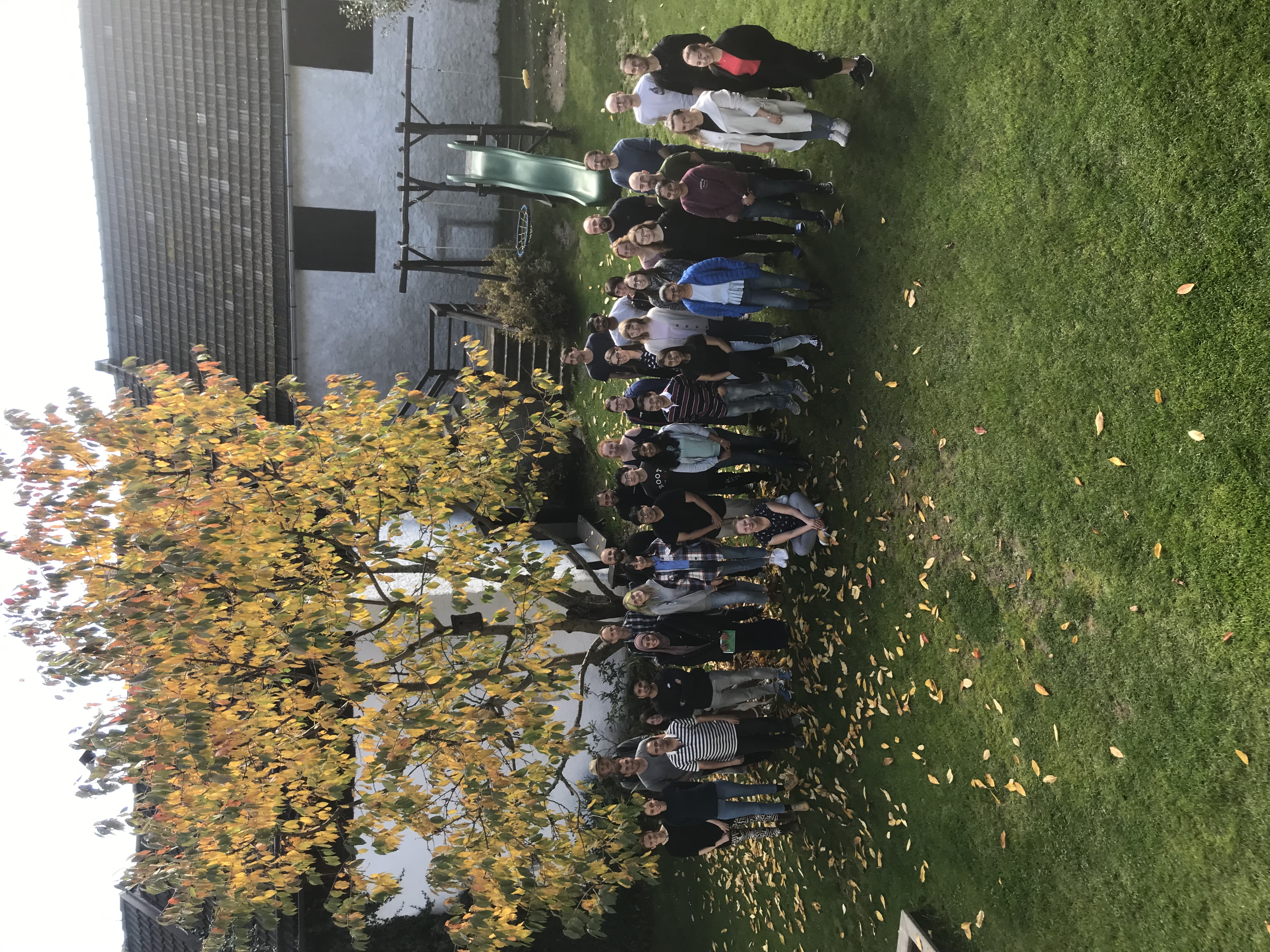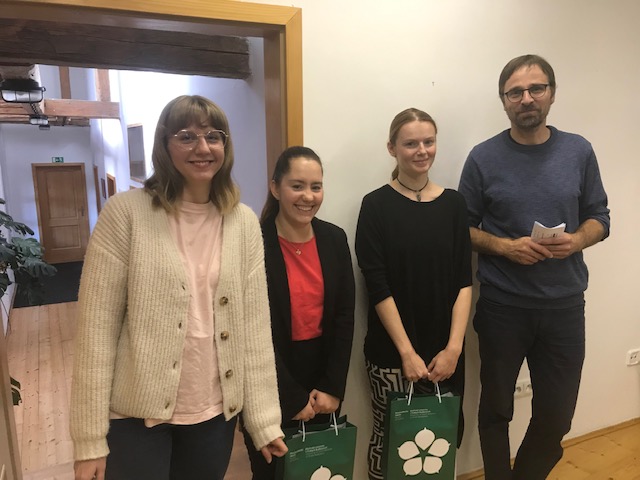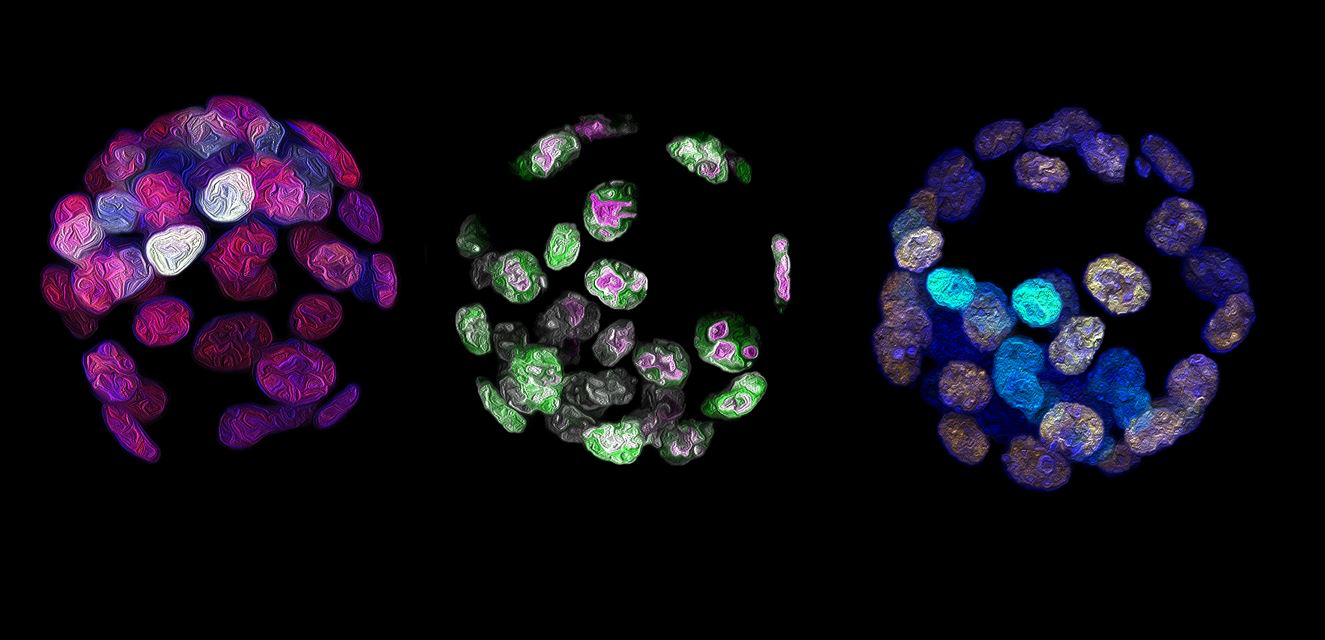Elections to the Academic Senate of the Faculty of Science for the period 2023-2026
- Seznam štítků: FoS
- Hits: 398
Article 1. General provisions
Article 2. Submission of an application for a rigorous examination
Article 3. Rigorous thesis
Article 4. Guaranteeing of the state rigorous examination
Article 5. The course of the state rigorous examination
Article 6. Effectiveness
prof. Ing. Hana Šantrůčková, CSc. RNDr. Petr Nguyen, Ph.D.
Dean Chairperson of the Academic Senate
Annexes:
- Annex 1 - list of the fields in which rigorous proceedings can be conducted
- Annex 2 - application for rigorous proceedings
List of fields in which rigorous proceedings can be held at the Faculty of Science of University of South Bohemia valid from 1. 11. 2022:
[1] A candidate who is a graduate of a Master's degree programme at FSci USB does not have to prove his/her education.
6th Annual PhD Retreat of the Department of the Molecular Biology and Genetics
Friday October 14 th – Sunday October 16 th 2022 - Penzion Mauritz, Bělá, Nová Pec

Organizers: Tomáš Doležal, Lenka Chodáková
Academics: Adam Bajgar, Alena Bruce-Krejčí, Tomáš Doležal, Hassan Hashimi, Aleš Horák, Eva Horáková, Jaroslava Lieskovská, Petr Nguyen, Michael Wrzacek, Julia Krasensky-Wrzaczek
Invited speaker: Alejandro Cabezas-Cruz
Friday 14.10.
from 15:00 ARRIVAL AND ACCOMMODATION (little refreshment will be ready)
17:00 WELCOME NOTE by Tomáš Doležal
17:10-18:50 PRESENTATIONS
17:10 Adam Zeiner CRK2 - bridge between symplastic and apoplastic pathways
17:30 Rebecca Collier The role of Tead4 in apical domain regulation in the preimplantation mouse embryo
17:50 Alyssa Fontanilla Epigenetic stability and transposon activity in somatic and reproductive aging
18:10 Mansi Sharma Redox signaling to chromatin during stress responses in plants
18:30 Tereza Kalistová The influence of salycilic acid on cuticle formation and its involvement in plant immunity and growth
19:00-20:00 DINNER – “GET TO KNOW EACH OTHER”
20:00- 21:00 Student discussion
Saturday 15.10.
8:00 – 9:00 Breakfast
09:00 - 10:40 PRESENTATIONS
9:00 Daniela Prokopová Post-encephalitic syndrome in patients with TBE and its effect to sleep disorders
9:20 Veronika Prančlová Molecular and inter-cellular interactions during TBEV replication
9:40 Eliška Kotounová Role of viral NS1 protein during pathogenesis of tick-borne encephalitis
10:00 Miriama Pekľanská Study of mosquito physiology and its factors determining vector competence for transmission of pathogenic diseases
10:20 Imen Mekki Non-coding RNAs in tick-host interactions
10:45-11:15 Coffee break
11:20 - 13:00 PRESENTATIONS
11:20 Dorsaf Ennaceur Candidate transport proteins for guanine in Chromera velia
11:40 Geetha Gonepogu Dynamics and Isolation of Guanine Crystals from Chromera velia
12:00 Shun-Min Yang Mitochondria targeting histone in Chromera velia
12:20 Satish Nandipati Comparative metabolic study of transcriptionally active Euglenozoa from marine sediments
12:40 Jhonny Hernandez Orozco Collagen – a novel inducer of plant immunity
13:00-14:00 Lunch
14:00 -15:30 free time
15:30 – 16:15 Invited lecture – Alejandro Cabezas-Cruz - Vector microbiota, a source of new targets for transmission-blocking vaccines
16:15-16:50 Coffee break
16:50-18:50 PRESENTATIONS
16:50 Magdalena Kaniewska Sex determination in the linden bug Pyrrhocoris apterus
17:10 Ping Chen Insect taiman gene evolution
17:30 Karolína Svobodová Nutritional supplement with antiviral properties for honeybees
17:50 Pavla Nedbalová Origin of adenosine released by Drosophila melanogaster activated immune cells
18:10 Gabriela Krejčová Macrophage-induced silencing of insulin signaling is an adaptive strategy for lipoprotein mobilization upon bacterial infection
18:30 Matěj Miláček Action of species-selective juvenile hormone receptor agonists on insect development
19:00-20:00 Dinner
20:00-21:00 Interview – Alejandro Cabezas-Cruz
Sunday 16.10.
8:00 – 9:00 Breakfast
9:00-10:40 PRESENTATIONS
09:00 Sadanand Gupta Characterization of individual PsaA and PsaB assembly intermediates of Photosystem I in Synechocystis 6803
09:20 Divya Aggarwal Binding of chlorophyll to ferrochelatase maintains active Photosystem II during cold stress
09:40 Saverio Rana Response of the unicellular diazotrophic cyanobacterium Cyanothece to phosphorus limitation
10:00 Andela Kuvelja Manganese and zinc priming of Capsicum annuum against Botrytis cinerea: photosynthesis; maintenance localised metal accumulation and metabolic changes
10:20 Anna Wysocka The role of cyanobacterial membrane protein ssr0332 in the biogenesis of Photosystem I
10:40-11:00 Coffee break
11:00-12:40 PRESENTATIONS
11:00 Pragya Tripathi Unusual composition of the mitochondrial pyruvate dehydrogenase complex from the widespread marine protist group diplonemids
11:20 Vendula Rašková Characterization of PAM related proteins in Trypanosoma brucei
11:40 Michaela Kunzová ROS is not just SOS: role of reactive oxygen species in metabolic remodeling during Trypanosoma brucei differentiation
12:00 Jonathan Wong Inner mitochondrial membrane biogenesis in Trypanosoma brucei
12:20 Prashant Chauhan Assembly factor mtSAF24 in the biogenesis of small mitoribosomal subunit in trypanosomes
12:45-13:00 CONCLUDING REMARKS, voting for the best presentation
WINNER ANNOUNCEMENT, GROUP PHOTO
13:00-14:00 LUNCH
14:00 THE END - departures
Gabriela Krejčová
Veronika Prančlová
Daniela Prokopová


| In vitro characterization of mutations in gene PTPN11 from individuals with neurodevelopmental disorders¨ | Mgr. Michaela Fencková, Ph.D. | Master thesis project - updated May 13th, 2024
|
| Bachelor or master thesis project | RNDr. Eva Horáková, Ph.D. | Our group is investigating the enigmatic role of phosphonates (molecules with carbon-phosphorus bonds) in eukaryotic cells. The eukaryotic ciliate Tetrahymena thermophila, with a high content of phosphonates on its cell surface, is one of the best models to answer our questions. Our goal is to determine the function of these enzymes in this metabolic pathway by generating knock-out strains and characterising them by molecular and biochemical methods.
|
| The role of genetic causes of neurodevelopmental disorders in cognitive dysfunction | Mgr. Michaela Fencková, Ph.D. | Bachelor or Master thesis project - UPDATE: project assigned |
| Modeling the effect of missense variants in intellectual disability and autism | Mgr. Michaela Fencková, Ph.D. | Bachelor or Master thesis project - UPDATE: project assigned
|
| Natural compounds blocking viral infections of honey bees | RNDr. Alena Bruce Krejčí, Ph.D. | Bachelor or Master thesis project |
| The micro-computed tomography of honey bee development | RNDr. Alena Bruce Krejčí, Ph.D. and Mgr. Adam Bajgar, Ph.D. | Bachelor or Master thesis project |
| The effect of selective pesticides on the development and physiology of honey bees | RNDr. Alena Bruce Krejčí, Ph.D. and prof. RNDr. Marek Jindra, CSc. | Bachelor or Master thesis project |
| Diplonemids - exploring the life cycles and morphology of "new-protists-on-the-oceanic-block" | Galina Prokopchuk, Ph.D. | Bachelor or Master thesis project - UPDATE: project assigned |
| Changes in the "universal" genetic code and their reflection in transfer RNAs | MSc. Ignacio Miguel Durante, Ph.D. | Bachelor or Master thesis project |
| Chromatin immunoprecipitation to profile histone modifications in naked mole-rat | Mgr. Lenka Gahurová, Ph.D. | Bachelor or Master thesis project - UPDATE: project assigned |
| Bioinformatics projects studying retrotransposons and their impact on genome evolution | Bachelor or Master thesis project - UPDATE: project assigned |
|
| Establishment of epigenetic CRISPR/Cas9 mutants of Arabidopsis thaliana (wet lab project) | Mgr. Iva Mozgová, Ph.D. (Naseem Samo) | Bachelor project |
| Identification and phylogeny of SET-domain proteins in protists (bioinformatics tentatively followed by wet lab) | Dr. Abdollah Sharaf | Bachelor or Master thesis project |
| Identification of Histone H3 variants in early-diverged eukaryotes (bioinformatics tentatively followed by wet lab) | Bachelor or Master thesis project |
|
| Evolutionary conservation of PRC2 catalytic subunit in the green lineage (wet lab project) | Mgr. Kateřina Sobotková, Ph.D. | Bachelor or Master thesis project |
| Changes in the levels of biogenic amines at honeybees in relation to seasonal effects | RNDr. Radmila Čapková Frydrychová, Ph.D. | Bachelor project |
| The stress effect on sound characteristics at honeybees | Bachelor project |
|
| Effect of reproductive process on the level of oxidative stress and telomere homeostasis in insects | Bachelor project |
|
| Investigate the reproductive fitness cost in epoxidase mutant adult males | Ing. Marcela Nouzová, Ph.D. - UPDATE: projects assigned | Bachelor or Master thesis project |
| Study the reorganization of the endocrine gland complex (EGC) during metamorphosis | Bachelor or Master thesis project |
|
| Study the interactions between fat body (FB), the tissue that synthesizes yolk proteins, and the ovaries endocrine gland complex (EGC) during metamorphosis | Bachelor or Master thesis project |
|